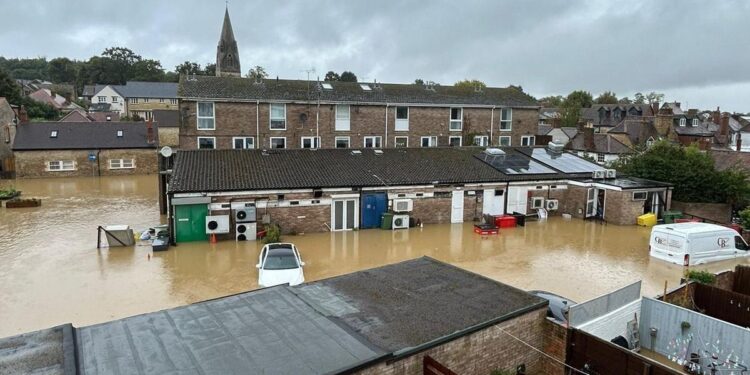Argentina’s Agricultural Heartland Faces Devastation Amid Unprecedented Flooding
Argentina’s core farming regions have been severely impacted by relentless flooding, forcing the evacuation of thousands and submerging extensive farmland under water. This catastrophic event, regarded as one of the most severe in recent decades, has left farmers confronting massive losses while communities remain on high alert. As emergency services mobilize to provide aid, concerns grow over the lasting repercussions for one of the globe’s leading agricultural producers. This article explores the ongoing crisis, its effects on local populations, and potential consequences for Argentina’s agricultural sector.
Widespread Damage to Agriculture Threatens Food Production and Economy
The torrential rains sweeping through Argentina’s vital farming zones have caused widespread destruction across agribusinesses already facing economic pressures. Thousands of hectares are flooded, with staple crops such as soybeans, corn, and wheat suffering extensive damage. Farmers are urgently attempting to save livestock and salvage what remains of their harvests; however, many face total devastation that jeopardizes both their livelihoods and broader food supply chains domestically and abroad.
The ramifications extend beyond immediate crop loss:
- Crop Destruction: Vast tracts remain submerged for prolonged periods causing irreversible damage to key commodities.
- Livestock Displacement: Many animals have been relocated to safer areas but significant fatalities have already occurred due to flooding conditions.
- Supply Chain Interruptions: Delays in harvesting and transportation threaten market stability with potential price increases anticipated globally.
The Argentine government has responded by rolling out emergency financial support packages alongside logistical assistance aimed at stabilizing affected farms. Despite these efforts, experts warn that recovery may be slow with long-term impacts on export volumes uncertain amid climate volatility trends.
Escalating Evacuations Amid Rising Floodwaters: Government Mobilizes Emergency Response
The scale of evacuations has intensified as floodwaters breach protective barriers in provinces like Santa Fe and Entre Ríos—regions critical for national food production. Thousands have been displaced from their homes as entire communities face inundation risks previously unseen in recent history. Local authorities report levee failures leading to rapid water encroachment onto residential areas and farmlands alike.
A coordinated government response includes:
- Shelter Establishment: Emergency centers stocked with essentials such as food supplies, clean water, medical care facilities are operational across affected zones.
- Rescue Operations: Military units alongside civil defense teams conduct search-and-rescue missions targeting vulnerable groups including elderly residents.
- Civil Society Partnerships: Collaboration with NGOs enhances distribution networks ensuring timely delivery of relief materials where needed most.
An official briefing from Argentina’s Ministry of Agriculture highlights ongoing damage assessments designed to optimize resource allocation during this evolving disaster scenario. Citizens are urged to follow official channels closely for updates while authorities continue managing rescue efforts amid challenging conditions caused by persistent rainfall patterns linked partly to shifting climate dynamics worldwide.
Sustainable Agricultural Practices: Building Resilience Against Future Flood Events
This devastating flood episode underscores an urgent imperative: adopting forward-looking strategies that bolster agriculture against increasingly frequent extreme weather events fueled by global climate change trends. With thousands displaced and crop losses mounting into millions of dollars annually—Argentina must pivot towards sustainable solutions enhancing resilience within its farming systems.[1]
- Diversifying Drainage Infrastructure Improvements: Upgrading drainage networks can accelerate runoff removal during heavy precipitation episodes reducing soil saturation levels significantly.[2]
- Cultivating Cover Crops: Integrating cover cropping techniques improves soil structure integrity thereby minimizing erosion risks while promoting moisture retention balance essential during dry spells post-flooding.[3]
- Developing Flood-Tolerant Crop Varieties: Breeding resilient strains capable of surviving excess moisture ensures yield stability even under adverse climatic stressors common in flood-prone regions.[4]
| Agricultural Strategy | Main Advantages |
|---|---|
| Enhanced Drainage Systems | Prevents prolonged waterlogging; protects root systems |
| Cover Cropping Practices | Improves soil health; reduces erosion risk |
| Flood-Resistant Crop Development | Maintains consistent yields despite flooding events |
| Integrated Disaster Preparedness Planning | Boosts community resilience; optimizes resource deployment during crises |
A comprehensive approach combining scientific innovation with grassroots knowledge sharing will be pivotal moving forward—enabling Argentine farmers not only survive but thrive amidst environmental uncertainties ahead.
Navigating Recovery: The Road Ahead for Argentina’s Farming Communities
The catastrophic floods ravaging Argentina’s agricultural heartland highlight a growing vulnerability among rural populations exposed increasingly often to extreme weather phenomena intensified by global warming effects documented worldwide.[5]. With thousands uprooted from homes alongside substantial infrastructure damages affecting roads & storage facilities critical for farm operations—the path toward recovery demands coordinated action between governmental bodies & private stakeholders alike focused on both immediate relief & long-term sustainability planning initiatives tailored specifically toward regional needs.
This unfolding crisis serves as a stark reminder that bolstering disaster preparedness frameworks is no longer optional but essential if nations wish safeguard food security amid escalating climatic threats globally.















